ASEAN FUTURE WORKFORCE COUNCIL
ASEAN FUTURE WORKFORCE COUNCIL
AFWC Formation Journey
The ASEAN Future Workforce Council (AFWC) was formed in June 2019 as a catalyst to advance business and industry cooperation in TVET in ASEAN. The AFWC’s vision is that future skills development in the ASEAN region is business and industry driven. The history of the AFWC dates back to 2018, when the ASEAN Secretariat with support from the German government’s Regional Cooperation Programme for Technical and Vocational Education and Training (TVET) in ASEAN (RECOTVET) initiated a regional learning process among ASEAN member states (AMS) with the objective is to identify challenges and solutions to strengthening business and industry cooperation in TVET.
Recognizing the need to move ‘from potential to realization’, the ASEAN Secretariat with support from RECOTVET launched a regional working group of TVET champions from business and industry at the 7th Regional Policy Dialogue on TVET, which took place in June 2018 at the ASEAN Secretariat in Jakarta, Indonesia. 20 representatives from chambers, associations and companies from all ten AMS were selected as members. It was the first time that a regional working group on TVET was composed only of business and industry representatives. Over the course of 5 workshops between June 2018 and March 2019 the group discussed how to make TVET in the ASEAN region fit for the future. The final product of the group is the Future ASEAN Agenda for TVET, a document that outlines specific, action-oriented recommendations for strengthening the contributions of business and industry in TVET.
After the AFWC’s launch at the 9th Regional Policy Dialogue on TVET in June 2019 in Bangkok, Thailand, the AFWC was officially recognized as a Joint Business Council by the ASEAN Business Advisory Council (ASEAN BAC).Subsequently in September 2020, AFWC was incorporated as the member of ASEAN TVET Council (ATC) .The ATC was launched by the ASEAN Labour Ministers Meeting (ALMM), ASEAN Education Ministers Meeting (ASED) and ASEAN Economic Ministers Meeting (AEM). The cross-sectoral body comprised of representatives from Ministries of Education, Ministries of Labour, Ministries of Commerce/ Industry/ Trade, and other relevant ministries of all ASEAN member states as well as the Southeast Asian Ministers of Education Organization Secretariat, the ASEAN Confederation of Employers, the ASEAN Trade Union Council and related divisions of the ASEAN Secretariat.
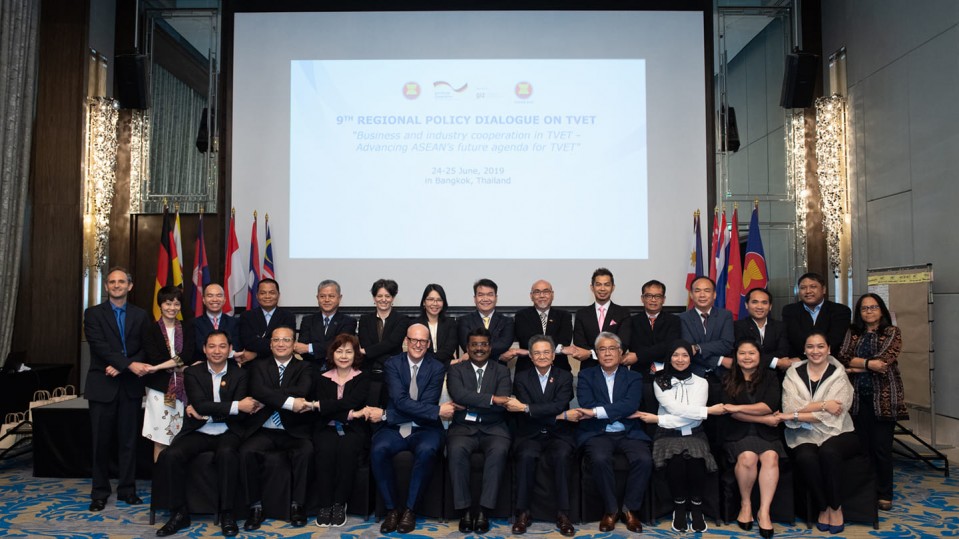
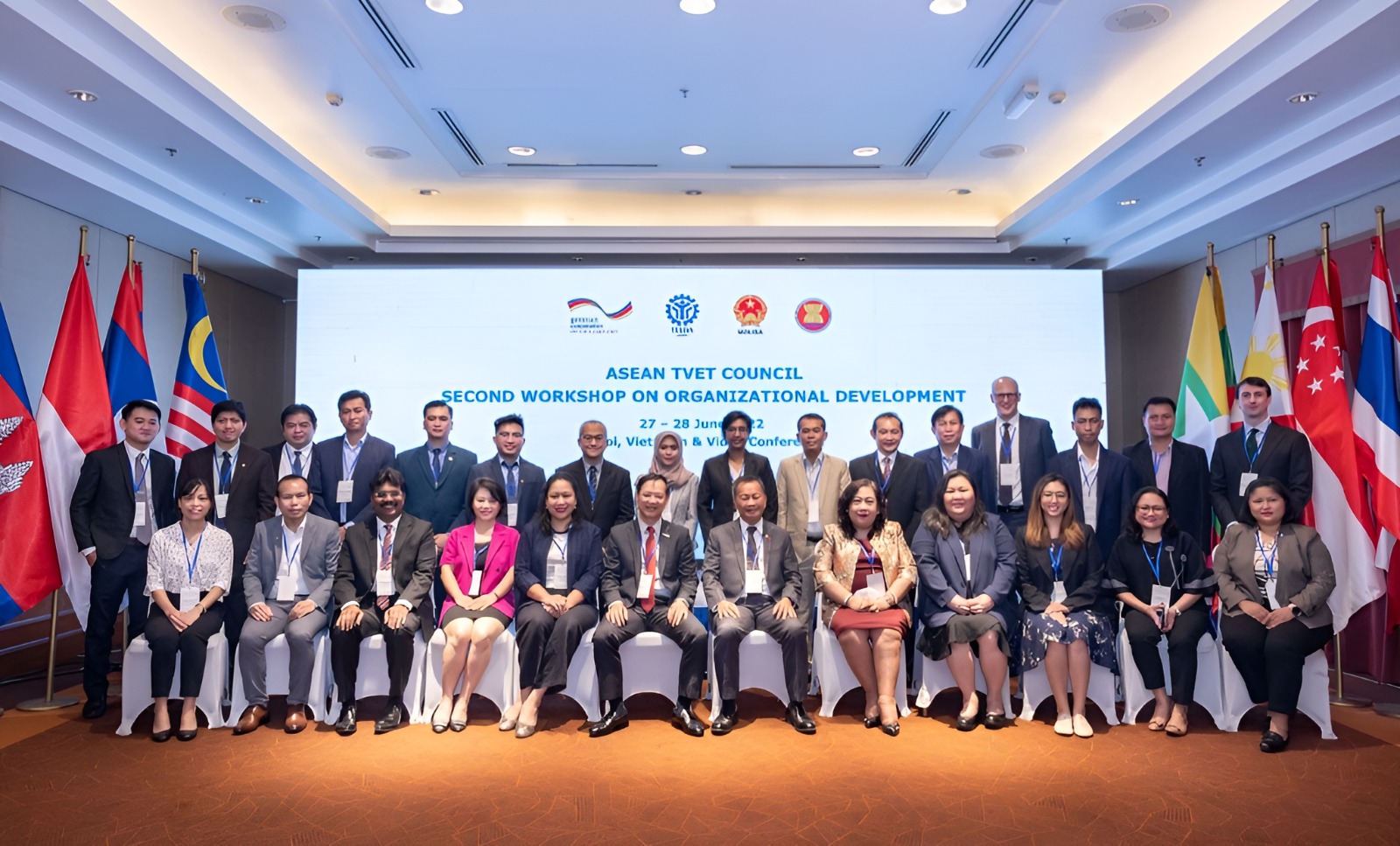
Event Highlights
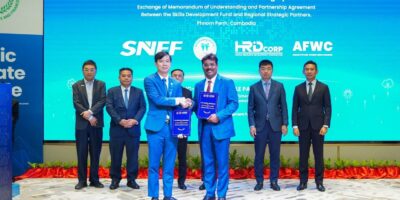
- Cambodia
- 04. 07. 2025 - 04. 07. 2025
Symposium on 3Ps Cambodia_for a Skilful Cambodia , Skills Development Fund, Cambodia (2025)
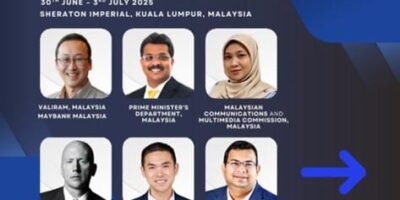
- Kuala lumper
- 30.06.2025 - 03.07.2025
3rd Annual Talent 4.0: Winning the Race for Talent, A Marcus event , Malaysia (2025)
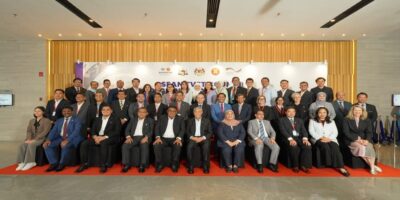
- MELAKA, MALAYSIA
- 11.06.2025 - 12.06.2025
4th ASEAN-TVET Council (ATC) Regional Policy Dialogue (RPD),Malaysia (2025)
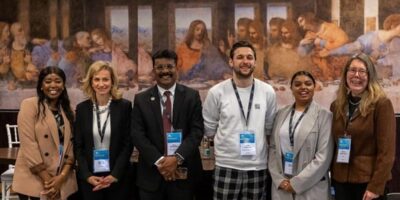
- Como, Italy
- 22.06.2024 - 24.06.2024
BILT Bridging Event ‘Towards inclusive excellence in TVET’, UNESCO UNEVOC BILT(2024)

- Singapore
- 04.06.2024 - 05.06.2024
EduData Summit 2025, hosted by @QS Quacquarelli Symond

- COMO, ITALY
- 22.04.2024 - 24.04.2024
Reimagining Education With Innovation TVET Transformation For Industry 4.0, SEAMEO VOCTECH
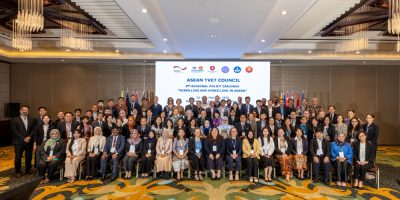
- BALI, INDONESIA
- 27.02.2024 - 28.02.2024
ASEAN TVET COUNCIL 3RD REGIONAL POLICY DIALOGUE
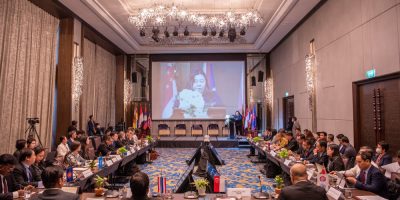
- BANGKOK
- 30.05.2023 - 31.05.2023
2ND ASEAN TVET COUNCIL REGIONAL POLICY DIALOGUE
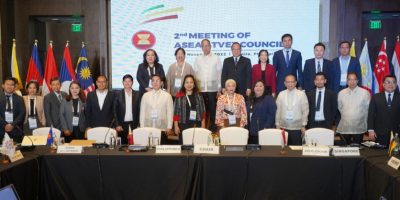
- MANILA
- 17.11.2022 -18.11.2022
2ND MEETING OF THE ASEAN TVET COUNCIL
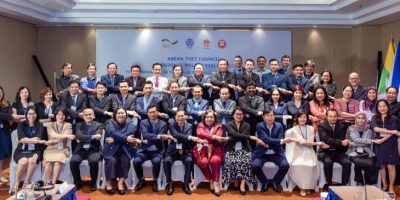
- HANOI
- 29.06.2022 - 30.06.2022
1ST ASEAN TVET COUNCIL REGIONAL POLICY DIALOGUE
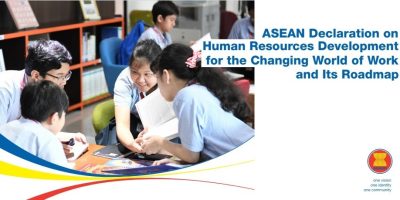
- VIRTUAL MEETING
- 27.04.2021 - 27.04.2021
MONITORING AND EVALUATION FRAMEWORK OF THE ROADMAP OF THE ASEAN DECLARATION ON HUMAN RESOURCE DEVELOPMENT FOR THE CHANGING WORLD OF WORK
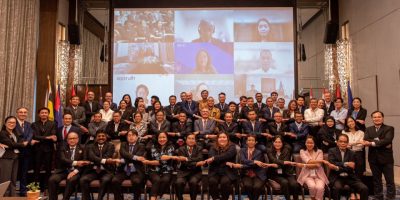
- ASEAN
- 03.06.2023
ASEAN TVET COUNCIL WEBPAGE OFFICIALLY LAUNCHED
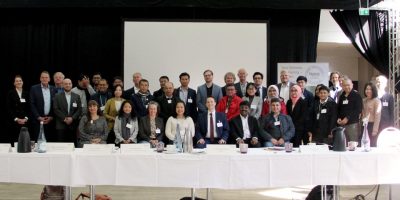
- ASEAN
- 01.12.2022
ASEAN TVET COUNCIL AND PARTNER DELEGATIONS ATTEND IMOVE ROUND TABLE
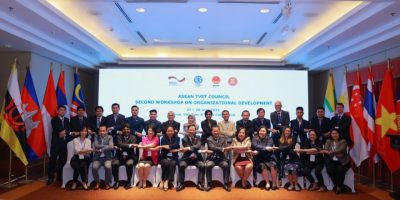
- ASEAN
- 17.10.2022
ASEAN TVET REGIONAL POLICY DIALOGUE TOUCHES ON TVET GOVERNANCE IN THE ERA OF DIGITALIZATION AND IR4.0
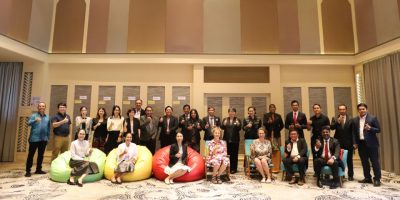
- ASEAN
- 24.09.2022
REGIONAL MEETING STRENGTHENS THE ASEAN STANDARD FOR IN-COMPANY TRAINERS IN THE DIGITAL ERA
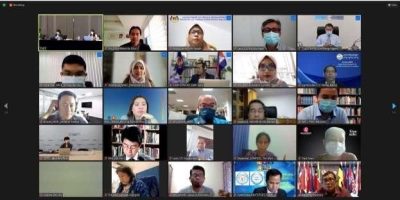
- ASEAN
- 14.06.2021
ASEAN TVET COUNCIL STEERS DISCUSSION ON THE NEW WORLD OF WORK AT ASEAN-ROK WORKSHOP
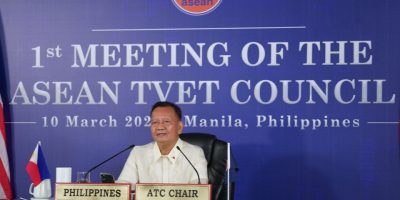
- ASEAN
- 15.03.2021
PHILIPPINES HOSTS FIRST ASEAN TVET COUNCIL MEETING
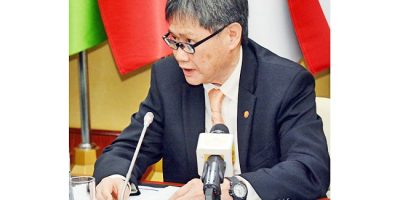
- ASEAN
- 15.03.2021
ASEAN-BAC LEGACY PROJECT HIRED TO STRENGTHEN HUMAN CAPITAL CAPACITY
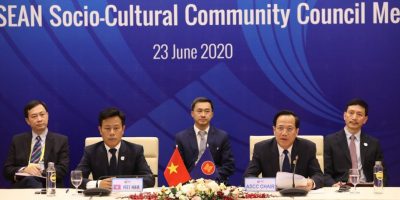
- ASEAN
- 21.07.2020
ASEAN LEADERS ENDORSE NEW DECLARATION ON HUMAN RESOURCES DEVELOPMENT
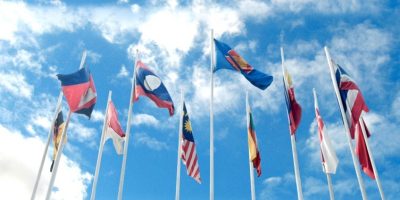
- ASEAN
- 13.07.2020
ASEAN TVET COUNCIL ENDORSED DURING 36TH ASEAN SUMMIT

- ASEAN
- 13.07.2020
ASEAN TVET COUNCIL ENDORSED DURING 36TH ASEAN SUMMIT
STRATEGIC AREAS

Digitalization

Green skills

Inclusivity
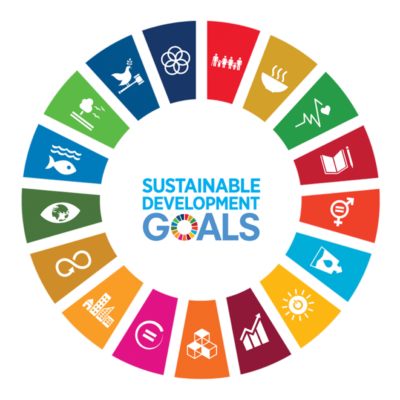
Sustainable Development Goal
Hotel International
You can book one these hotels near conference venue
Hotel Plaza
You can book one these hotels near conference venue
Hotel Luxury
You can book one these hotels near conference venue

- Federation of Malaysian Manufacturers

- Singapore National Employers Federation
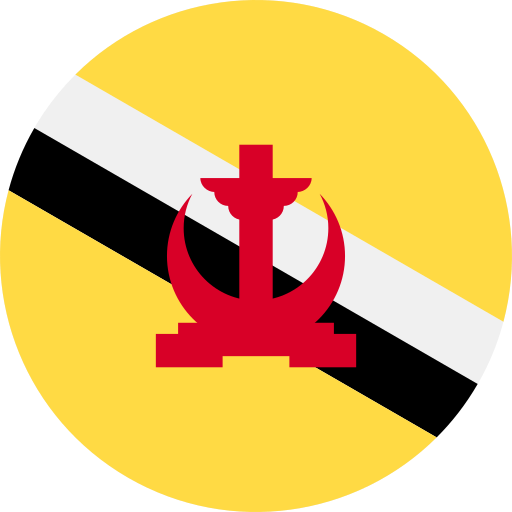
- Brunei Institution of Surveyors, Engineers and Architects
- ASEAN-Business Advisory Council Brunei

- Federation of Thai Industries
- Thai Chamber of Commerce
- BETAGRO PCL

- Indonesian Chamber of Commerce and Industry
- Dicoding Indonesia

- Vietnam Chamber of Commerce and Industry
- Vietnam Association of Construction Contractors

- Union of Myanmar Federation of Chambers of Commerce and
Industry - Myanmar Heating, Ventilation, Air-conditioning and Refrigeration
Association

- Philippine Chamber of Commerce and Industry – Batangas
- Philippine Chamber of Commerce and Industry – Tarlac
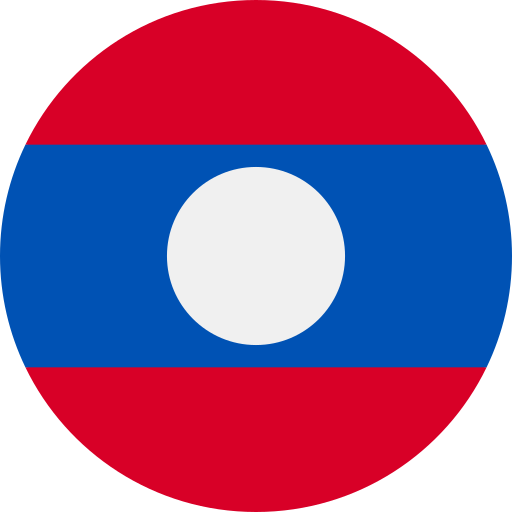
- Lao National Chamber of Commerce and Industry Association of
Lao Garment Industry - Lao Automotive Industry Association
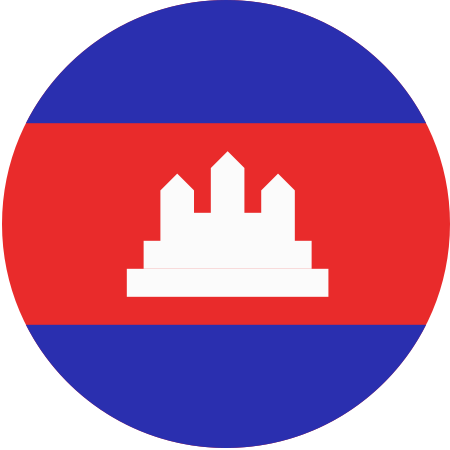
- Cambodian Federation of Employers and Business Associations
(CAMFEBA) - Young Entrepreneurs Association of Cambodia
